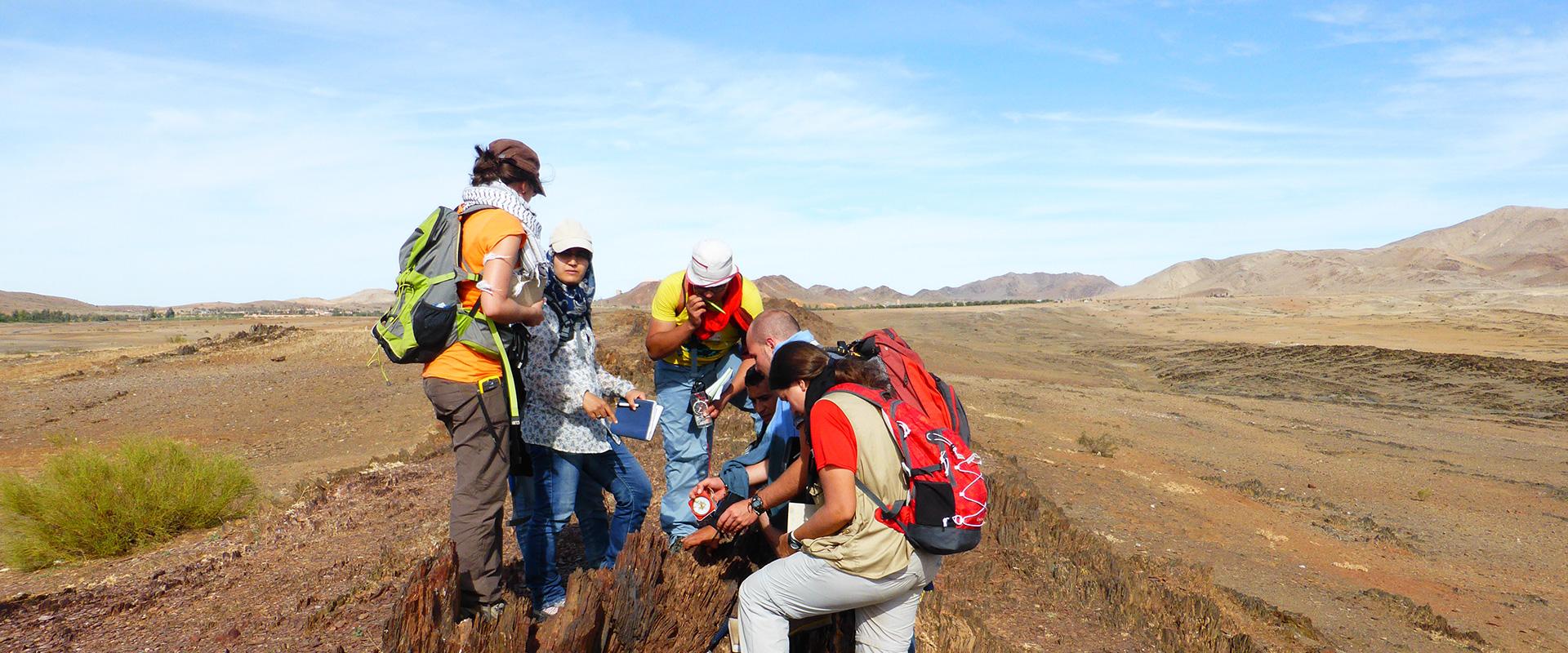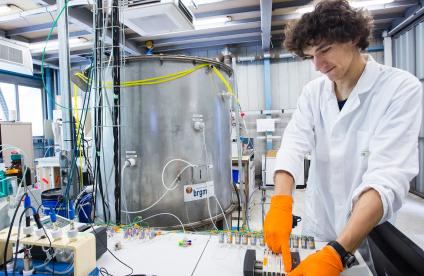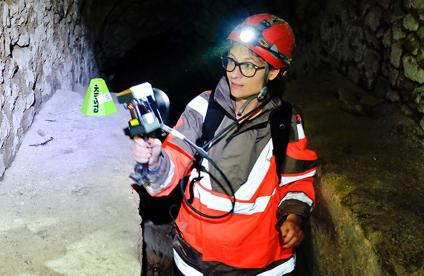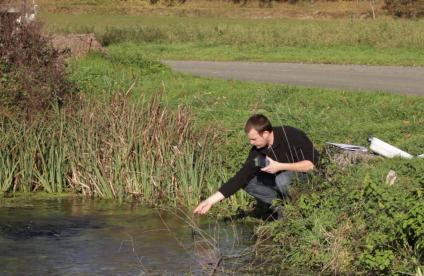Through its diploma courses, "BRGM Campus" is broadening the field of highly specialised training in the geosciences. The aim is to cater for the needs of industry and society in all fields involving soils and subsoils.
Support to higher education in the geosciences
Our activities under the "BRGM Campus" label aim to:
- deliver BRGM training in the geosciences, in close cooperation with universities and the Grandes écoles, through courses run by higher education establishments for technicians, engineers, undergraduates and postgraduates;
- deliver these training courses through educational partnerships with academia, businesses and the national geological survey organisations of other countries.
In 2016, the BRGM Campus label integrated Enag (national school for geoscience applications), the former BRGM school created in 2010 to promote higher education in geosciences.
BRGM Campus: covering the entire higher education spectrum (first degree, masters and PhD)
BRGM Campus covers the entire higher education spectrum (first degree, masters and PhD) as well as BRGM's various fields of expertise in the geosciences: geology and knowledge of the subsurface, groundwater management, risks and spatial planning, mineral resources and the circular economy, energy transition, digital data.
BRGM Campus has developed partnerships with various higher education programmes in mainland France and overseas:
- Vocational first degree course to train depollution technicians for work in contaminated sites - Marne-la-Vallée
- Vocational first degree course on subsurface resources - French Guiana
- Master's in Earth, Planetary and Environmental Sciences - Orléans
- Master's in Risks and the Environment - Orléans
- Master's in polluted Sites and Soils - Nancy
- Diploma course in Energy and Environmental Engineering - INSA Lyon
Employment and careers

Vocational first degree course to train depollution technicians for work in contaminated sites - Marne-la-Vallée
This vocational degree course to train depollution technicians for work in contaminated sites is designed to fill the training gap identified in France by professionals in the depollution sector.
The University Gustave Eiffel - Paris Est Marne la Vallée and BRGM Campus were assisted by partner companies for the development of a vocational training course to prepare qualified technicians to work on depollution projects in compliance with best practice and with health and safety rules.
A first degree course on block release
The teaching staff for this vocational course are recruited from leading organisations, companies or universities in the field of soil and site depollution in France. This block-release training course is designed to boost students' acquisition of professional skills.
The course is organised into two semesters and four topic areas:
- Basic concepts
- Sampling in contaminated sites
- Depollution operations
- Managing depollution worksites
The course runs from mid-September to the beginning of September in the following year, with students working for 6 months in the partner company. The training modules are organised either at University Gustave Eiffel - Paris Est Marne la Vallée or at the BRGM.
Student profiles for the vocational degree to train depollution technicians for work in contaminated sites
The course is open to holders of a 2-year higher education diploma (BTS) in the geosciences, water management, chemical engineering or civil engineering.
Company employees who do not hold a BTS-type diploma may also be eligible subject to accreditation of prior work experience.
Training schools
The University Gustave Eiffel - Paris Est Marne la Vallée is an academic establishment with recognised expertise on soil pollution. It is the coordinator of an Erasmus Mundus PhD course on the development of treatment processes for contaminated soils. It also organises an international summer school on the characterisation and depollution of contaminated soils.
Under the "BRGM Campus" label and in its capacity as the national geological survey organisation, the BRGM provides support to higher education in the geosciences field. To do so, it develops collaborative activities to support academic organisations.

Vocational first degree course on subsurface resources - French Guiana
The vocational first degree course at the University of French Guiana in the field of natural forest resources, specialising in "uses of subsurface resources", trains qualified technicians looking to meet needs of society and industry for sustainable mineral resource extraction and management (mines and quarries), especially gold.
Thanks to close collaboration with Guiana's mining industry, students receive training in applied geology for subsurface resource prospecting and extraction, the geology of Guiana's mining environment and the restoration of mining sites in tropical environments.
A partnership between the University of Guiana and the BRGM for sustainable management of subsurface resources
Sustainable management of mineral resources is a major issue for society, especially in countries like Guiana with high population growth, abundant natural resources, high demand for materials and a high unemployment rate, among young people in particular.
Natural resource depletion is another major concern for the sustainability of our societies and demands rational resource extraction. The geosciences have a vital role to play in both extraction and production of primary and secondary mineral resources as well as in securing supplies of the strategic substances that are essential to the development of certain energy technologies.
The University of Guiana and BRGM Campus decided to work together on the LP RNF-VALORESS diploma course to better prepare students to address the issues at stake in managing subsurface resources sustainably.

Master's in Earth, Planetary and Environmental Sciences - Orléans
The Master's course in Earth, Planetary and Environmental Sciences at the University of Orléans trains professionals to understand and manage natural systems (mineral and organic resources, water, soils, heat, etc.), addressing their many levels of complexity. The "observation-experimentation-modelling" triad is central to the course.
Graduates will be qualified for applied engineering work in a wide range of sectors such as sustainable mineral resource prospecting and management, geomaterials, geothermal energy, energy storage and sustainable water and soil management (depending on course options).
Georesources, Geomaterials and Geodynamics (G3) course
This course option focuses on the dynamics and quantification of endogenous geological processes. It draws on the world-class expertise of ISTO and BRGM research teams in metallogeny, magmatic petrology and geodynamics, and on Planex equipex high-pressure high-temperature analytical facilities at ISTO and the campus laboratories.
In each semester, teaching is organised around a field course (e.g. in the Massif Central, Armorican Massif, Andalucía or Morocco). Field observations make up the core of projects/practical assignments in geomatics, data management, predictive geology and experimental or digital modelling. Graduates are also trained to understand the socio-economic dimensions and issues that arise in the georesources field.
Environment Geochemistry and Geomatics (Geo2Env) course
This course aims to train scientific experts in environmental diagnoses, drawing on fundamental and applied knowledge on the functioning of natural and artificial environments. Digital geomatics tools (databases, GIS, digital maps, 3D models, geostatistics) bring decisive competences to handle visualisation and decision-support tools.
These management-level scientists will provide expertise in sustainable natural resource management in continental environments, especially water (free-flowing and aquifers) and soils, in the context of global change.
BRGM: lead partner for the Master's course on Earth, Planetary and Environmental Sciences
Run by the Sciences of the Universe Observatory in the Centre Region (OSUC), the federating component for geoscience research at the University of Orléans, the course is backed by the OSUC research laboratories, especially those of ISTO (Orléans Institute of Earth Sciences). The course is supported by the Voltaire labex and the Planex equipex.
The BRGM is a leading player in this Master's course and is involved in some 20% of the teaching in all the fields addressed.

Master's in Risks and the Environment - Orléans
The Master's course in Risks and the Environment (RE) at the University of Orléans aims to train young graduates in the fundamentals of applied sciences on the environment, energy and industrial risks management.
Graduates will have mastered the tools they need to address pollution issues (origins, diagnoses, analyses, remediation) in all environmental compartments (atmosphere, water and soils).
They will be trained for employment in innovation, research and development in sectors related to energy (use, management and production), the environment (depollution, treatment, prevention, risk analysis) or transport (automobiles, aeronautics, new fuels).
Chemistry, Pollution, Risks, Environment (CPRE) course
The "Chemistry, Pollution, Risks, Environment" course, in which BRGM is involved, trains specialists in the fields of energy and the environment. Graduates have a global approach to environmental risks with in-depth knowledge in the following areas :
- combustion and fossil and clean energies,
- risk management (industrial, chemical, nuclear, waste),
- pollution and depollution (air, water, soil).
Close interaction with research players in Orléans, including the BRGM
The Risks and Environment Master's builds on close interaction with research conducted in the laboratories at Orléans Grand Campus (University of Orléans, CNRS, BRGM, INRA), well known for excellence in their research topics, with the regional DREAM competitiveness cluster on water and environment and the Voltaire Labex (studies on volatile geofluids, from deep Earth to the upper atmosphere), the CAPRYSSES Labex (high-temperature chemistry - Energy cluster) and the PIVOTS project (innovation platforms in the Centre-Val de Loire region).

Master's in polluted Sites and Soils - Nancy
This 2nd-year Master's course on Polluted Sites and Soils (SSP) at the University of Lorraine aims to acquire skills identified in the NF X31-620 standard on requirements for services in the field of polluted sites and soils.
Students in this alternating course are trained for engineering posts with study or advisory missions or depollution project management, mainly with specialised organisations but also with companies needing to manage environmental liabilities.
In the first semester (September to end March), teaching at the University alternates with company placements (three 3-week periods). The second semester (April-August) takes place exclusively in the company.
A University of Lorraine-BRGM partnership to meet the needs of professionals
This Master's course follows on from a consultation with professionals in industrial depollution, conducted by the BRGM on request from the Ministry for the Environment, which had pinpointed a lack, in France as a whole, of specific training to Master's level in the area of polluted sites and soils.

Diploma course in Energy and Environmental Engineering - INSA Lyon
INSA's Energy and Environmental Engineering department (GEn) trains multi-skilled engineers for the energy and environment sectors.
A cohort of 66 engineers is trained each year, who mainly find employment in energy production and distribution, energy engineering for buildings and transport and process and environmental engineering.
GEn engineers mainly find employment in energy production and distribution (~30%), energy engineering for buildings and transport (~30%), and process and environmental engineering (~30%). They work in similar proportions for large groups, SMEs and SMIs, but also for local government, State services and agencies (ADEME, DREAL),universities and research centres (CEA, CNRS, CSTB) and in the NGO and humanitarian sector (HESPUL, RONGEAD).
They have varied responsibilities within their organisations (engineering consultancies, research and development, operations, production, business and sales management, training), with an important technical component, especially at the start of their career.
INSA Lyon-BRGM partnership to better prepare students to address energy transition issues
The energy transition towards low-carbon sources is a major issue for society in the context of climate change and regulation of greenhouse gas emissions. Natural resource depletion is also a major concern for the sustainability of our societies, which demands a transition to a circular economy based on increasing use of secondary resources.
INSA Lyon and BRGM Campus decided to join forces to run the GEn engineering diploma course and promote vocational training with links to the research activities of both organisations in this field, and thus to better prepare students to address energy transition issues.









